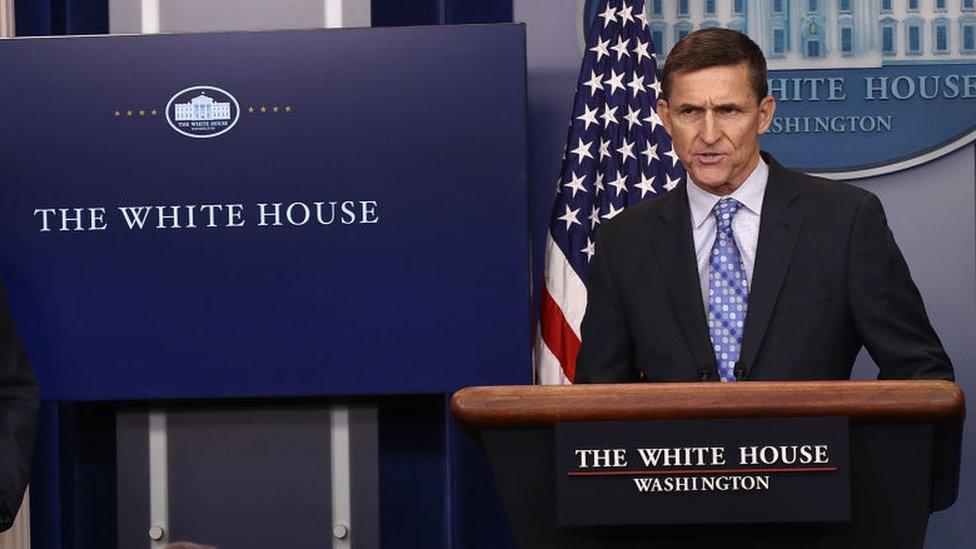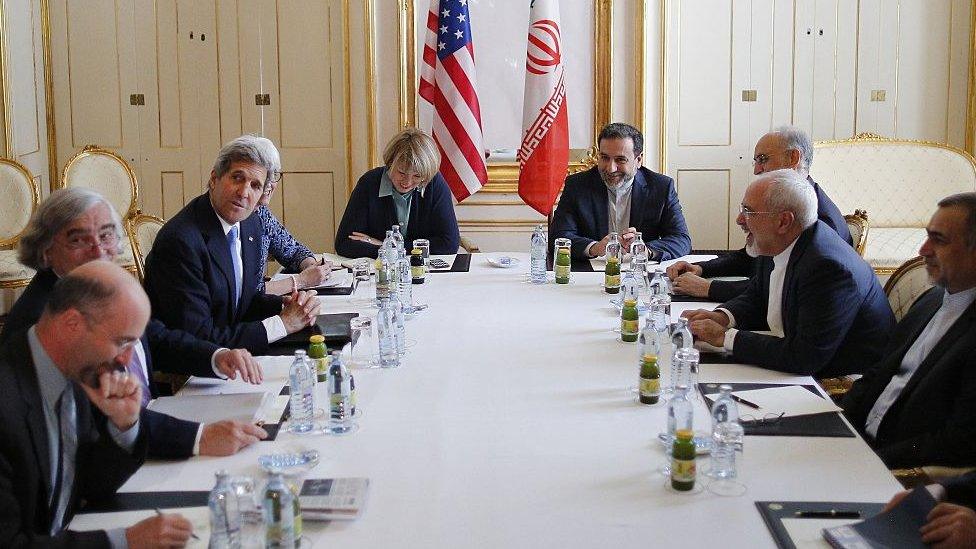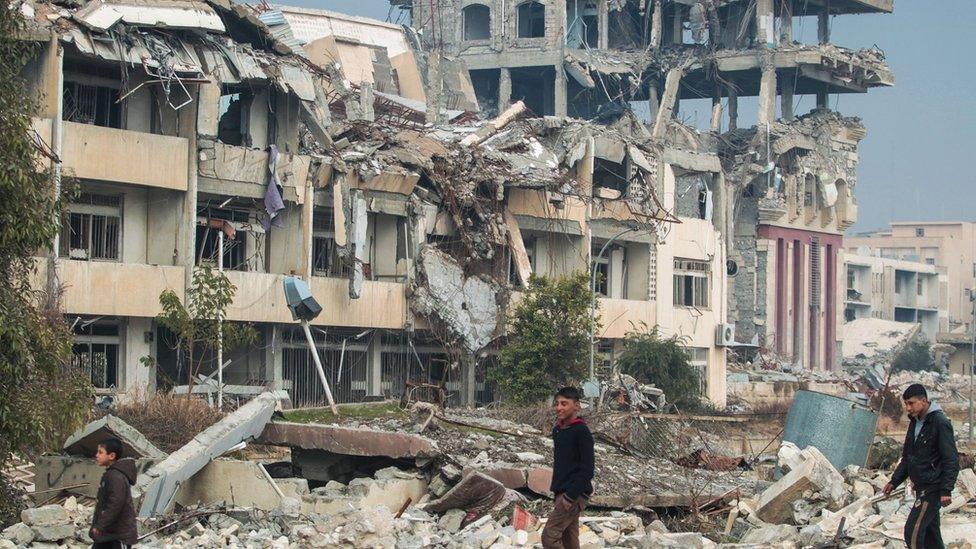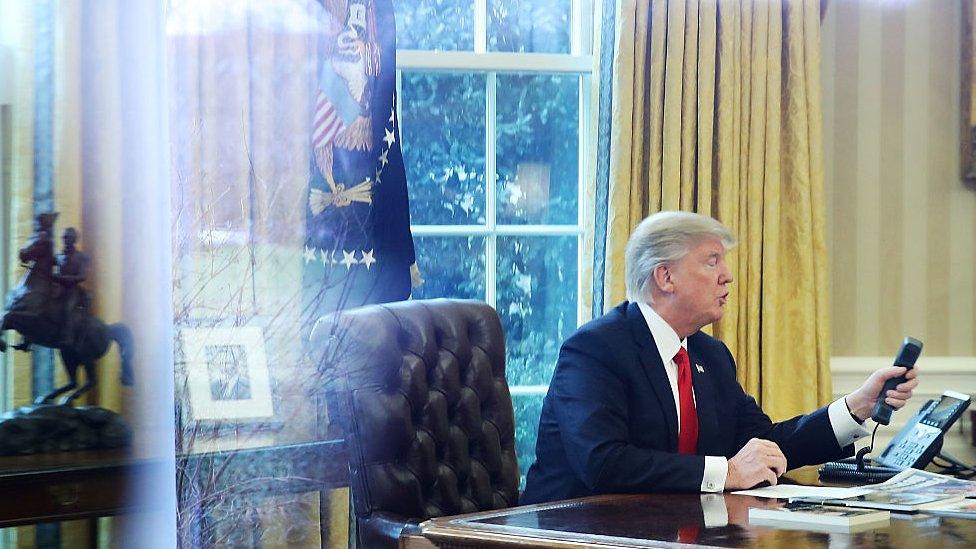Trump administration sanctions Tehran - but what now?
- Published

Iran is "on notice" after a missile test, National Security Adviser Michael Flynn says, but didn't specify what US ramifications would be
Within days of an Iranian missile test and a subsequent warning from the Trump administration, the US has now followed up by imposing a new round of economic sanctions.
The sanctions focus upon suppliers to Iran's missile programme and groups that help to arm what Washington sees as terror organisations in the region.
It is hard to see what practical impact these sanctions will have, since few of these organisations or individuals probably do business in the United States.
But the sanctions sends a clear warning to Tehran the guard has changed in Washington.
The Obama administration saw its relationship with Iran largely through the prism of the need to negotiate a deal to constrain Tehran's nuclear programme.
Iran's regional activities - support for Hamas and Hezbollah, military support for the Assad regime, backing of the Houthis in Yemen, and its growing influence in Iraq - were all played down to ensure that the nuclear deal might go ahead.
For the Obama team, restraining Iran's nuclear activities was the overarching goal.
This was seen as an end in itself, one that might stave off military action, but also a step that might, over time, also lead Iran away from its relative economic isolation towards an improved relationship with the West.
Opinion was deeply divided on the nuclear deal.
The US and its major western allies, along with Russia, saw merit in the nuclear agreement that effectively "kicked the can down the road", postponing any confrontation with Tehran over its nuclear programme.

Negotiating the Iran nuclear deal
Washington's regional allies though - countries like Israel, Saudi Arabia and other Gulf states, who have watched Tehran's rise with alarm - were much less impressed.
And many of them may well have been hoping that the Trump team - which includes several vocal opponents of Tehran - might seek to undo the agreement.
Things are a little more complex than that. On a recent trip to Israel's major annual security conference last week, many experts and officials there took the view that a bad deal, if properly implemented, might be better than no deal at all.
What worries Israelis is the fact that Iran is now becoming a major player in the region.
Its support for the Assad regime in Syria and the deployment of its allies - Hezbollah and various Shia militias, supported by officers from its Revolutionary Guard Corps - has provided Tehran with at least the opportunity to establish its allies on a long border with Israel from the Mediterranean Sea through Lebanon and Syria - all the way to the Jordanian frontier.
Jordan too is concerned, as are several of the Gulf states, which explains their quiet strategic rapprochement with Israel.
The irony in all of this is that it was largely US military power that established the conditions for Iran's rise to regional prominence.
By deposing its archenemy Saddam Hussein and reducing Iraq to a minor military player with many other security problems on its plate - Washington opened the door to the expansion of Iranian influence in the region.

Iraqi boys walk near the University of Mosul after its liberation from IS
A further irony is that in supporting the Iraqi government's efforts against so-called Islamic State, the US is objectively allied with Tehran, with several Iranian-influenced Shia militias fighting in the same campaign.
The Obama administration's failure to countenance the forced removal of Syria's President Assad and its inept and half-hearted efforts to arm and train Sunni forces there, again favoured the emerging Shia axis.
So the Trump administration comes to office with a desire fundamentally to change Washington's stance towards Tehran. These sanctions are but the first step.
A declaration that Iran is now "on notice", in the words of National Security Adviser Michael Flynn, may sound good, but it doesn't amount to a policy.
What real steps does the Trump team envisage?
Is it ready to back - albeit reluctantly - the nuclear accord while monitoring stringently Iran's behaviour?
What wider international support can the US gather for tougher action against Tehran's missile programme - which it insists it is entitled to pursue?
On the face of it here the US may have a point. UN Security council resolution 2231 calls on Iran not to undertake any activity related to ballistic missiles designed to be capable of delivering a nuclear weapon.

A US National Security Council briefing earlier this week noted that ballistic missiles designed to be capable of delivering a payload of at least 500kg to a range of 300km are inherently able to deliver nuclear weapons.
"There should be no doubt," the briefing went on , "that the United States is committed to holding Iran accountable for adhering to missile restrictions and accountable for behaviour in the region that we consider to be destabilising."
But what exactly does the Trump Administration mean by phrases like "holding Iran to account"?
These are two countries whose warships potentially come into close proximity in Gulf waters every day. Tensions could spark a major confrontation. Is Washington on a collision course with Tehran?
Its rhetoric might suggest so. But it is President Trump's actions - and of course Iran's own responses - that will determine where things go from here.